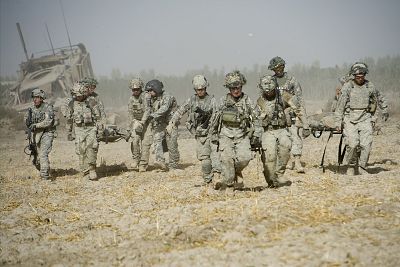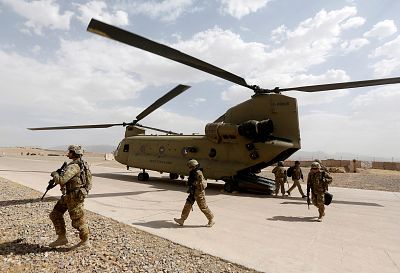"We were devoid of a fundamental understanding of Afghanistan — we didn't know what we were doing," a senior American official is quoted as saying.
A trove of government documents shows that U.S. officials systematically misled the public about the war in Afghanistan during three presidential administrations, the Washington Post reported in an explosive story on Monday.The Post said the documents showed that senior U.S. officials hid evidence and distorted statistics to make it appear that the U.S. was winning the war in Afghanistan, where American forces toppled the Taliban in 2001, and claims they show that there was no consensus on the war's objectives or how it would end."We were devoid of a fundamental understanding of Afghanistan — we didn't know what we were doing," Douglas Lute, a three-star Army general who served as a war czar for Afghanistan under the George W. Bush and Barack Obama administrations, said in one a 2015 interview, according to the Post. Lute was not available for comment.
The paper obtained the 2,000 pages of documents — including what it says are notes from more than 400 interviews with military commanders, diplomats, and aid workers as well as Afghan officials that were part of a "lessons learned" project — after a three-year legal battle. The Post also said it obtained hundreds of memos by former Secretary of Defense Donald Rumsfeld.NBC News has not been able to independently review the documents and the White House, State Department and Pentagon did not immediately responded to requests for comment.The Post published the documents two days after U.S.-Taliban talks restarted, and compared them to the Pentagon Papers — a top-secret government study that was packed with damaging revelations about America's conduct in the Vietnam War leaked to The New York Times and the Post in 1971.The war in Afghanistan is America's longest and it has raged on for 18 years. America has had boots on the ground there since 2001, when U.S. forces toppled the Taliban regime for harboring Osama bin Laden, the architect behind the Sept. 11 attacks.Since then, just under 2,300 American troops have died in the war-torn country. Between January 2009, when the United Nations began a systematic documentation of civilian casualties, and September this year, some 34,000 Afghan civilians died as a result of the armed conflict.The head of the federal agency that conducted the interviews, John Sopko, declined to comment to NBC News in advance of the reports' publication. But Sopko told the Post that the documents show "the American people have constantly been lied to."In one of the reported interviews, Army Col. Bob Crowley, who served as a senior counterinsurgency adviser to U.S. military commanders in 2013 and 2014,told government interviewers in 2016 that "every data point was altered to present the best picture possible.""Surveys, for instance, were totally unreliable but reinforced that everything we were doing was right and we became a self-licking ice cream cone," the Post quoted him as saying.The paper said that the documents showed that as the war dragged on U.S. military commanders found it difficult to articulate who they were fighting, let alone why."I have no visibility into who the bad guys are," Rumsfeld, Secretary of Defense under Bush, complained in a Sept. 8, 2003, memo, according to the Post.
Through a spokesperson, Rumsfeld declined to comment. At the same time, in public those in charge of the war continued to emphasize that they were making progress, the paper reported.Government officials would spin casualty counts and other figures to make it appear that troops and resources were having the desired effect, an unnamed senior National Security Council official is quoted as saying in the documents."Attacks are getting worse? 'That's because there are more targets for them to fire at, so more attacks are a false indicator of instability,'" he reportedly said, mimicking how the government would spin.













